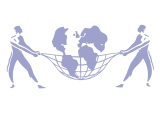Interview with Paul Murphy, Executive Director at Saferworld
31 Jan 2013
Why does Saferworld work on security and justice and what do you do?
Security and justice are as integral for dignified human life as other development areas such as health or education. Saferworld advances this belief by engaging with development and other actors at the international, national, and local levels to work on security and justice issues. We work through country programmes to reduce insecurity and the risks of conflict, with the aim of providing an improved environment for recovery and development. Over the past 7 years we have been increasingly engaged in implementing our community security programming, which is about making sustainable improvements to people’s experiences of safety and security at the ground level. Our community security programmes are very much focused both on the end result and on the process of bringing communities and power holders together to solve common security problems. Key components of our programming work are about building on existing individual and community capacities and resources to enhance safety; empowering people at a local level to interact with their authorities, with an emphasis on strengthening the position of women; and expanding the capacity of governments to respond in a transparent and legitimate manner.
Can you give an example of Saferworld’s security and justice work in conflict-affected and fragile states?
In 2013 we began a joint programme in South Sudan, Yemen, and Bangladesh aimed at creating an improved environment for reconstruction and development through increasing public safety and security. In South Sudan, where we have been working since 2002, people at a community level still experience a variety of conflicts and insecurity. Saferworld’s programming within this project focuses on three key areas: firstly, strengthening the legitimacy and accountably of law enforcement agencies and the responsiveness of civil authorities to consult with local communities on security provisions; secondly, building the capacity of local communities and CSO’s to hold dialogue with authorities and governments, as well as hold them to account on security provision and conflict prevention intervention; and thirdly, using results and lessons from the programme to encourage other international and national development actors to create more integrated responses to local conflict and insecurity.
What are the main challenges implementing this type of work?
Often people’s daily experiences of insecurity are manifestations of underlying social, economic, and political dynamics within their communities, countries, and regions. Inappropriate security and justice policies and programmes can themselves also cause or inflame conflict. Identifying what contributes to insecurity and safety concerns in a community is central therefore and can be challenging. Within our community security work there is a clear emphasis on ensuring that what constitutes ‘community’ and ‘security’ is framed and situated in an appreciation of the context.
In the past, security and justice have not been given the prominence it warrants in international development practice. Fortunately, there is now a growing recognition that these basic needs matter in terms of broader development policy, as reflected for example in the 2011 ‘New Deal for Engagement in Fragile States’; however, despite this, you will often still see ‘development’ and ‘security’ interventions siloed and not purposefully linked. Equally, while there are ambitious policies relating to fragile states, there remains a striking ‘implementation gap’ between these goals and the realities of delivering concrete changes in highly complex and fragile environments.
Internally we have recognised that while we have substantial experience in security and justice programming as an organisation we need to focus more strongly on consolidating learning from our community security approach. While each of our programmes on community security is context specific, in response we have established a cross-organisational community security group to consolidate and build on our collective knowledge and better share experiences of challenges and successes from our programmes.
How does Saferworld contribute to informing international security and justice work?
Our national and international work is directly linked to our programmes; we work with governments, security and justice providers, national civil society groups, and donors to demonstrate more effective approaches to combining development, conflict prevention, and security programming. We promote security and justice sectors that are effective, accountable, and responsive to the needs of the most vulnerable in society. We also work in collaboration with other civil society groups, encouraging governments and the UN to include key peacebuilding priorities in the development framework that will replace the Millennium Development Goals from 2015 onwards.
For additional information please see:
Saferworld's issue page on security and justice
Saferworld's work in South Sudan
Documentary on Saferworld's community security programme in Shida Kartli

